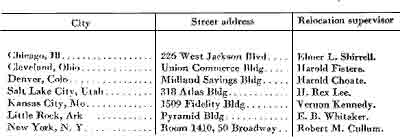[FONT=Tahoma,Verdana,Trebuchet MS,Trebuchet,Geneva,Helvetica,Arial,sans][SIZE=-1]The job of this agency, briefly, is to assist in the relocation of any persons who may be required by the Army to move from their homes in the interest of military security. So far, the work of the WRA has been concerned almost exclusively with people of Japanese descent who formerly lived close to the Pacific rim of the country.
[/SIZE][/FONT]
[FONT=Tahoma,Verdana,Trebuchet MS,Trebuchet,Geneva,Helvetica,Arial,sans][SIZE=-1]At first, plans were made by the Western Defense Command and the WRA to build accomodations only for a portion of the 110,000 evacuated people. A considerable percentage of them, it was hoped, would move out of the restricted area and resettle inland on their own initiative. During March of 1942, some 8,000 actually did move, but the great majority were held back by limited resources, general uncertainty, and mounting signs of community hostility in the intermountain region. By the latter part of March, it had become apparent that such a large-scale exodus could be handled effectively on a planned and systematic basis. Accordingly, all further voluntary evacuation was halted by the Western Defense Command on March 29 and plans were initiated by the WRA for establishing relocation centers with sufficient capacity and facilities to handle the entire evacuated population for as long as might be necessary.
[/SIZE][/FONT]
[FONT=Tahoma,Verdana,Trebuchet MS,Trebuchet,Geneva,Helvetica,Arial,sans][SIZE=-1]The relocation centers, however, are NOT and ever were intended to be internment camps or places of confinement. They were established for two primary purposes: (1) To provide communities where evacuees might live and contribute, through their work, to their own support pending their gradual reabsorption into private employment and normal American life; and (2) to serve as wartime homes for those evacuees who might be unable or unfit to relocate in ordinary American communities. Under regulations adopted in September of 1942, the War Relocation Authority is now working toward a steady depopulation of the centers by urging all able-bodied residents with good records of behavior to reenter private employment in agriculture or industry.[/SIZE][/FONT]
